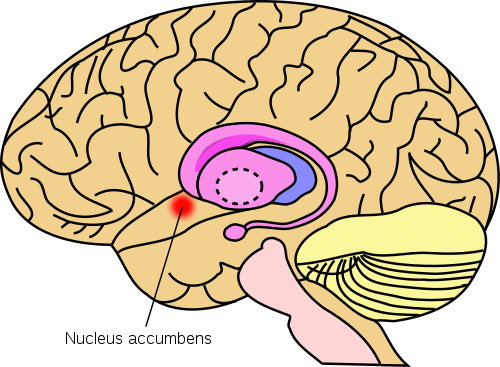Have you ever experienced a “conference high?”
Not, I’m not talking about what happens when you skip out on the afternoon session because you got a whiff of something “totally legal in this state.”
I’m talking about the feeling you get when a great speaker is on the stage and you realize… “I’m actually learning something here.”
Feels good, doesn’t it?
Turns out that’s no coincidence.
In a cover story for the Humboldt Foundation, Dr. Manfred Spitzer writes about the nucleus accumbens, a structure deep down in the brain that is activated by positive experiences. I’ll let Dr. Spitzer elaborate…

The location of the Nucleus Accumbens, courtesy Wikipedia. Doesn’t it feel good to learn something new?
“As long as everything goes to plan and nothing occurs with which we are not already familiar, this module does nothing. If, however, something happens that is better than expected, the module is activated and we become alert, turn our attention to the experience and process it more thoroughly. And most importantly: we learn better.
“In the long term, this allows us to learn about everything that is good for us. The nucleus accumbens is, therefore, neither pleasure nor addiction centre, and only incidentally a happiness centre. Rather, it is our brain’s own learning booster.”
What does this all mean in practical terms? I’ll throw it back to Dr. Spitzer:
“The bad news is: the module of our brain that is responsible for experiencing happiness is focused not on permanent happiness but on permanently finding interesting novelties.
“The good news is: those who have understood that learning and happiness are very closely linked in our minds will know that the experience of happiness is always possible throughout life. Thus answers to the question of happiness can be found precisely where you would least expect them: in learning! From a neurobiological point of view, describing school as “the serious side of life” is, therefore, rather misguided.”
Countless other studies, both qualitative and quantitative, back this up.
Learning creates happiness, even if it feels difficult in the moment.
Next time your kids complain about learning, remind them of this. (Kids love adults who know everything!)
I don’t mean to say that you should tell your customers should go out and learn (though that couldn’t hurt).
I mean that if you keep finding ways to learn — taking courses, training — that it can create a better customer experience.
Think about your own experiences as a customer. How have you felt in cases where you felt like you had to educate a customer service agent or salesperson? How does that make you feel about the person you’re talking to and the company that trained them?
Contrast that with those rare moments when a customer service agent understands you and can provide the help you need.
No escalating to a supervisor.
No opening a ticket and waiting days for a response.
Just relief… and happiness.
You may not work directly in customer service or sales, but you can provide this kind of happiness for your customers.
A happy organization is a successful organization. According to a study by Happier:
Many other studies show that happy, engaged employees perform better and stick around longer.
We can all agree that a happy team is important. And if we know that learning leads to happiness, then it stands to reason a team that’s learning on a regular basis is important.
But before you say “we train all our employees, we’re doing great!” …let’s differentiate between Required Minimal Training and True Learning.
What I define as Required Minimal Training is the training a new employee expects to receive:
When I implore organizations to offer their employees True Learning, I’m talking about supplemental training that makes sense within the context of the job description but goes above and beyond. Some examples, to help illustrate:
Education and enrichment of all kinds help us become better versions of ourselves — at work and wherever we are!
There are plenty of things to learn about that can benefit you and your team. I’ll focus on Customer Experience educational resources here, since that’s the topic nearest and dearest to my heart.
What’s not to love about Podcasts? They’re free, available anywhere, and are easy to digest during your commute.
Looking for some good CX Podcasts? Check these out:
Joey Coleman and Dan Gigniss from the Convince and Convert team offer inspiring examples of customer experience, great stories of customer service, and tips on how to make your customers love you even more.
CX strategist Blake Morgan provides surprising and counter-intuitive insights on customer experience, social customer service and content.
Visit The Modern Customer Podcast
Cohosted by Adam Toporek and Yours Truly, this podcast is all about learning from business leaders of ALL kinds who are innovating in many cases (and disappointing in others.)
Join Adam and I as we hear from Fortune 500 executives, authors, retail magnates, product poobahs and entrepreneurs making things happen.
Visit Crack the Customer Code (The final episode #500 aired November 2022)
A series of bite-sized episodes where I, Jeannie Walters, answer the listeners’ questions about employee & customer relationships. Get actionable tips for real-life CX scenarios.
Want to take things to the next level? Try starting a “podcast club.”
Just like a book club, pick a podcast and get together once each week to discuss it. It’s a wonderful way to stay accountable and spread learning across your team!
Online learning has boomed, and it’s a wonderful thing. Courses are convenient, you can learn at your own pace, and these days there’s on online course for anything you’d ever want to learn.
When it comes to business training, I don’t think there’s a better game in town than Linkedin Learning.
I’ve created three courses myself with Linkedin Learning:
If you’re not a Linkedin Learning subscriber already, you can get a month for free by clicking here — plenty of time to take in all three courses.
For as fantastic as podcasts and online courses are, there’s nothing quite like bringing in an outside consultant to run a CX workshop with your team.
Workshops are an incredible way to train your team in a collaborative and interactive way. If you feel like your team isn’t aligned, a workshop can be like braces. It’s definitely a larger commitment and getting buy-in from top leadership may require some work, but all my consulting clients would agree it’s well worth it.
If you’d like to have a no-commitment, no-sales-push talk about what a workshop might look like for your team, contact us.
Of course, the downside to having an endless supply of podcasts, online courses, and other educational opportunities is that it can become overwhelming. “Analysis Paralysis” is real and it’s powerful.
So what should you learn about first?
I recommend looking for resources that satisfy these two criteria:
“Indirectly” is a key term here. Don’t think that if you work in sales, all your training has to be sales-related. Remember the examples we looked at above: To help patients with diabetes, a healthcare provider offered classes with chefs and nutritionists.
Think outside the box. You might be surprised what’s relevant to your industry, department, and customers.
If you don’t find it at least a little bit interesting, you’re not going to stick with it.
Sure, learning leads to happiness, but not when it’s about something you absolutely don’t care about.
Needless to say, Customer Experience is very interesting to me, and — biases aside — I’d argue that CX is relevant to any organization.
But while I’ll always beat the drum of CX education, the real key to happiness here — yours, your team’s, and your customers’ — is to just keep learning.
Dedicating yourself to learning is a wonderful way to make yourself and those around you a little bit happier. If we could all dedicate a little more of our time to learning about the world around us, I think it would be a much happier place for us all!
 Jeannie is an award-winning customer experience expert, international keynote speaker, and sought-after business coach who is trailblazing the movement from “Reactive Customer Service” to “Proactive Customer and Employee Experience.” More than 500,000 people have learned from her CX courses on LinkedIn Learning, and her insights have been featured in Forbes, The Chicago Tribune, The Wall Street Journal and NPR.
Get Jeannie’s insights in your inbox each week by subscribing to The Weekly Win and follow her on LinkedIn, Instagram and YouTube.
Jeannie is an award-winning customer experience expert, international keynote speaker, and sought-after business coach who is trailblazing the movement from “Reactive Customer Service” to “Proactive Customer and Employee Experience.” More than 500,000 people have learned from her CX courses on LinkedIn Learning, and her insights have been featured in Forbes, The Chicago Tribune, The Wall Street Journal and NPR.
Get Jeannie’s insights in your inbox each week by subscribing to The Weekly Win and follow her on LinkedIn, Instagram and YouTube.